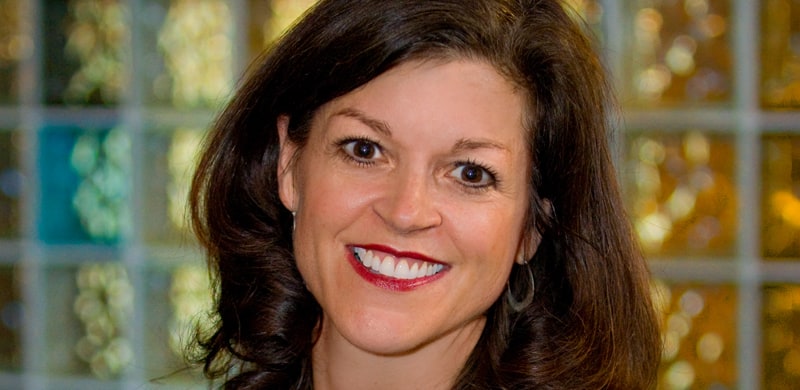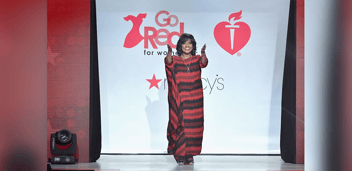
LESLIE FERRELL’S
FAVORITE THINGS
Hobbies:
“Skiing, running, and reading are kind of my top three. They are how I restore.”
VeggieTales Character:
“Bob. He’s so sensible. But you know what Bob also is? Bob is such a great supporter… I guess I resonate with it as a leader in the company. I hope that’s what I am to the staff.”
Competitors Who Are
Doing it Best:
“I do admire what my colleagues are doing at DreamWorks both on TV and the theatrical side… In terms of America’s appetite for children’s entertainment, Pixar is in the lead, and I give them that hands down. Honestly, I have appreciated many times some of the lessons that are in their stories. They are not overtly faith-based, but they tell redemption stories.”
Songs of the Moment:
“Touch The Sky,” Hillsong UNITED; “Holy Spirit,” Francesca Battistelli; “The Wrong Well,” Susan Ashton
GMA Industry Executive Interview: Leslie Ferrell
By Lindsay Williams
Before joining Big Idea Entertainment in 1999, Leslie Ferrell was in full-time college ministry with Cru (formerly Campus Crusade). Her husband was a pastor, and they were living in Chicago with their young children. Once her kids were school-age, Ferrell re-entered the workforce, taking a marketing job at Big Idea’s office in downtown Chicago. Today, the wife and mother is General Manager of Big Idea Entertainment and currently one of only a small number of females leading faith-based entertainment companies. While Big Idea (the team behind the VeggieTales brand, now owned by DreamWorks) relocated to Nashville in 2003, Ferrell stayed in Chicago, not wanting to uproot her family. A proper work/life balance is one of the things she appreciates most about her company and one of the values she attempts to maintain for both men and women at Big Idea in her current role.
Stepping out of back-to-back meetings at this year’s ICRS, Ferrell recently sat down with us to talk about women in the faith-based marketplace, what it’s like now being owned by a major Hollywood studio, her favorite veggies and whether or not women can really have it all.
As a working mom, how do you balance career and family?
As a woman executive, one thing I’ve appreciated, certainly [at] Big Idea, is that I’ve always felt really supported in what I do with my career, but also as it compliments the station [in life] that my family is in. I just think as women, we are very concerned [about having] the proper balance and priority with family and with raising our kids, as do men. I just think that is definitely a key component of a woman’s career… I am very thankful that, for me, I can say it was congruent working for a faith-based company. That value for family definitely was reflected in how I was treated and the accommodations made for me. I hope that is true across the faith-based industry for both men and women. It really should be something we are about, right?
There’s an obvious lack of females in leadership roles at faith-based companies. Why do you think that is?
There really aren’t that many women executives in the faith-based industry. It’s really true. I don’t think it’s because there aren’t women who aspire to it… It’s funny being with VeggieTales because, [although] VeggieTales is faith-based, it has a pretty wide crossover. For instance, down at ICRS, I’m in meetings and it’s almost all men. Meanwhile, when I’m in general market meetings, it’s very different. There’s much more of a mix at the leadership table. So it’s so interesting, but I always notice it. It’s so different. The faith-based [market] is maybe five to ten years behind what’s happening in the larger world.
Do you think companies are now more open to having females in leadership?
I think the culture has just changed. Fifteen years ago, even in my circles, I was really at one point the only woman who was working outside of the home. I think in the evangelical circles, if it can happen, in the younger years of raising children there’s a lot of support for someone who stays home… Today, I think it is increasingly difficult to live on one income… I think a lot more couples who are raising children, each partner is bringing in an income in some way. Now, if they don’t have to, great; but for many I think it’s safe to say it’s a luxury to live on one income.
What are some of the characteristics you feel a female executive must possess?
That’s a good question. I guess the standard leadership qualities that are required in a leader [would be] vision, decisiveness, integrity, communication, [and the ability] to be clear and roll out plans that can be executed. So on the leadership side, it’s true regardless of gender. I think one of the things as a woman I can bring to the table is the ability to be able to express—the emotional side. [As] a woman, I can let feelings be expressed in the appropriate settings that actually can be a guide to decisions or even team building.
“It used to be… that you were not supposed to ever feel, regardless of gender. And now I think there is much more of a sense that it’s actually part of what builds trust…”
It used to be in my early days, professionally, that you were not supposed to ever feel, regardless of gender. And now I think there is much more of a sense that it’s actually part of what builds trust on the part of management teams and even within the organization—how you feel about certain decisions, feelings about managing people, the frustrations, whatever. They can be expressed; and actually they become indicators, kind of guideposts, to what might be growing issues that can be addressed… They really are guides to bigger issues.
Do you feel like you can be more empathetic when you view things on a human level versus always viewing things on a professional level?
I think a woman understands there are stages of life, because she herself is going through those stages. Realizing that half your workforce is going through those same stages, I think it’s just huge that you can bring that to the role. You can look out on the people you’re leading, and you can have a good understanding of both sides of the coin.
How has your partnership with DreamWorks been? Do you feel like you’re moving in the right direction?
Yeah, it’s been a great experience to be a part of one of the Hollywood studios. It’s been wonderful to see our creative bandwidth expand. They’re storytellers. Although we have that uniqueness of faith-based storytelling, they have access to that whole bandwidth of writers, directors [and] producers, many of whom are believers… We’ve added new writers, our show runner, [and] just a host of story boarders and directors… Also, DreamWorks just has partnerships that, because of their size, we didn’t have.
How has the acquisition impacted the company culture at Big Idea?
DreamWorks, they’re always in the top 20 companies to work with. I think their rank is consistently 15 or higher… Although we were always a remote office…they’ve really tried to mirror the same benefits that the Glendale [home] offices have. For instance, at the Glendale office, they have a cafeteria where breakfast and lunch is served every day free of cost. They have a beautiful facility. It’s amazing. They couldn’t do that at the remote offices—it just wasn’t feasible or practical—but they just do all these things like snacks and Coke machines, and twice-a-month doughnut parties. So they give me a budget to kind of bring into the culture…a host of benefits that we are just appreciating.
How has your process changed now that you have a VeggieTales series on Netflix?
Oh my gosh, it’s been so different going from a longer length of 45-50 minutes…down to 11-minute stories. The storytelling changes to get your characters to figure out the problem of the story, solve it [and] bring it to a close. Also, TV production is so much brisker. A DVD, from development to completion, is a 14-15-month cycle. On TV, basically you’re doing your development in about two-and-a-half weeks and your production in another three weeks. We’re doing 156 episodes, which is massive. So that means 156 songs [and] 156 stories, because we have a song in every story… For those who had already done TV it was a learning curve for them to learn the brand and to learn how to get across that faith-based lesson in 11 minutes instead of 45 without it feeling like a verse slap, just throwing a verse in… DreamWorks has been a great help to us in bringing us some of those great writers and also being sensitive to the DNA of the brand. There’s no editing out the faith-based content, but the format’s different. Now we put the Bible story in the lesson and it’s part of the story… The characters are actually living the lesson.
Has there been a recent movie or TV show aimed at children that’s inspired you?
Cinderella. I really liked how they approached that story. Of course, I was keenly aware of how they were dealing with Cinderella, you know, what it means to be a woman. I love what they did with the story. They kind of turned it on its head… Here in the story, throughout the dialogue, the prince says he loves her not for what’s on her outside, but what’s on her inside. And they literally write that. She’s a woman in her own right. She’s not walking around waiting to be rescued by the prince… You see her make deliberate choices to be someone of kindness and courage. Actually, it’s written in the dialogue. She’s determined to be that, and she doesn’t live her life looking for meaning outside of who she is (i.e. the prince)… For a second I thought, ‘OK, I have two grandchildren—both girls—and I would want them to see this,’ because, there’s just really some nice things that we would all agree with in terms of the role of women.
For more info, visit www.veggietales.com.
##




